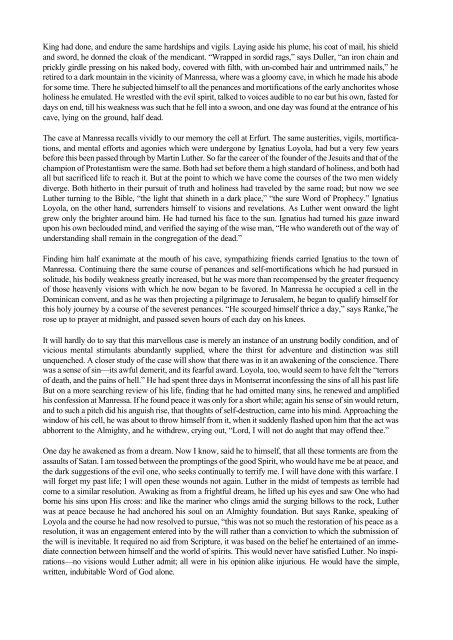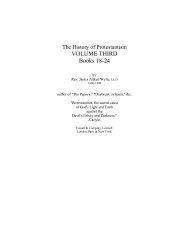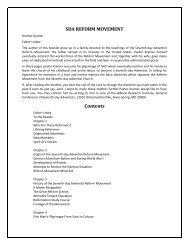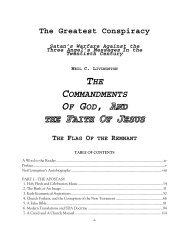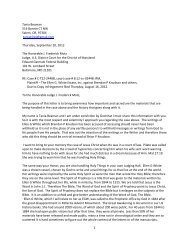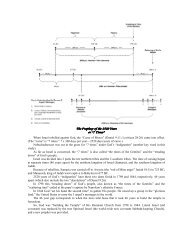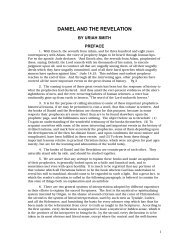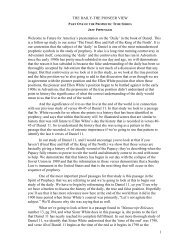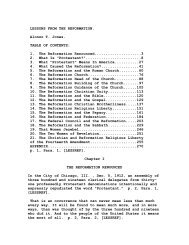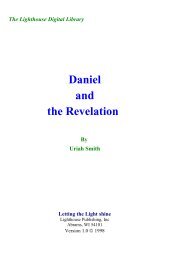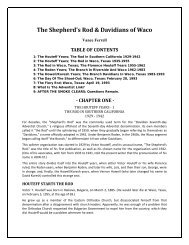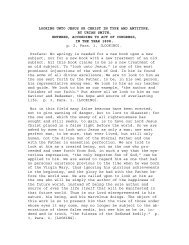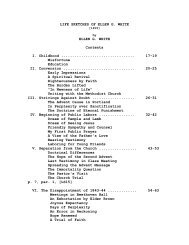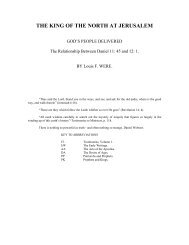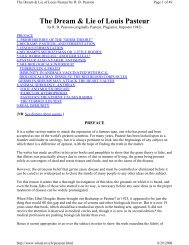History of Jesuits
History of Jesuits
History of Jesuits
You also want an ePaper? Increase the reach of your titles
YUMPU automatically turns print PDFs into web optimized ePapers that Google loves.
King had done, and endure the same hardships and vigils. Laying aside his plume, his coat <strong>of</strong> mail, his shield<br />
and sword, he donned the cloak <strong>of</strong> the mendicant. “Wrapped in sordid rags,” says Duller, “an iron chain and<br />
prickly girdle pressing on his naked body, covered with filth, with un-combed hair and untrimmed nails,” he<br />
retired to a dark mountain in the vicinity <strong>of</strong> Manressa, where was a gloomy cave, in which he made his abode<br />
for some time. There he subjected himself to all the penances and mortifications <strong>of</strong> the early anchorites whose<br />
holiness he emulated. He wrestled with the evil spirit, talked to voices audible to no ear but his own, fasted for<br />
days on end, till his weakness was such that he fell into a swoon, and one day was found at the entrance <strong>of</strong> his<br />
cave, lying on the ground, half dead.<br />
The cave at Manressa recalls vividly to our memory the cell at Erfurt. The same austerities, vigils, mortifications,<br />
and mental efforts and agonies which were undergone by Ignatius Loyola, had but a very few years<br />
before this been passed through by Martin Luther. So far the career <strong>of</strong> the founder <strong>of</strong> the <strong>Jesuits</strong> and that <strong>of</strong> the<br />
champion <strong>of</strong> Protestantism were the same. Both had set before them a high standard <strong>of</strong> holiness, and both had<br />
all but sacrificed life to reach it. But at the point to which we have come the courses <strong>of</strong> the two men widely<br />
diverge. Both hitherto in their pursuit <strong>of</strong> truth and holiness had traveled by the same road; but now we see<br />
Luther turning to the Bible, “the light that shineth in a dark place,” “the sure Word <strong>of</strong> Prophecy.” Ignatius<br />
Loyola, on the other hand, surrenders himself to visions and revelations. As Luther went onward the light<br />
grew only the brighter around him. He had turned his face to the sun. Ignatius had turned his gaze inward<br />
upon his own beclouded mind, and verified the saying <strong>of</strong> the wise man, “He who wandereth out <strong>of</strong> the way <strong>of</strong><br />
understanding shall remain in the congregation <strong>of</strong> the dead.”<br />
Finding him half exanimate at the mouth <strong>of</strong> his cave, sympathizing friends carried Ignatius to the town <strong>of</strong><br />
Manressa. Continuing there the same course <strong>of</strong> penances and self-mortifications which he had pursued in<br />
solitude, his bodily weakness greatly increased, but he was more than recompensed by the greater frequency<br />
<strong>of</strong> those heavenly visions with which he now began to be favored. In Manressa he occupied a cell in the<br />
Dominican convent, and as he was then projecting a pilgrimage to Jerusalem, he began to qualify himself for<br />
this holy journey by a course <strong>of</strong> the severest penances. “He scourged himself thrice a day,” says Ranke,”he<br />
rose up to prayer at midnight, and passed seven hours <strong>of</strong> each day on his knees.<br />
It will hardly do to say that this marvellous case is merely an instance <strong>of</strong> an unstrung bodily condition, and <strong>of</strong><br />
vicious mental stimulants abundantly supplied, where the thirst for adventure and distinction was still<br />
unquenched. A closer study <strong>of</strong> the case will show that there was in it an awakening <strong>of</strong> the conscience. There<br />
was a sense <strong>of</strong> sin—its awful demerit, and its fearful award. Loyola, too, would seem to have felt the “terrors<br />
<strong>of</strong> death, and the pains <strong>of</strong> hell.” He had spent three days in Montserrat inconfessing the sins <strong>of</strong> all his past life<br />
But on a more searching review <strong>of</strong> his life, finding that he had omitted many sins, he renewed and amplified<br />
his confession at Manressa. If he found peace it was only for a short while; again his sense <strong>of</strong> sin would return,<br />
and to such a pitch did his anguish rise, that thoughts <strong>of</strong> self-destruction, came into his mind. Approaching the<br />
window <strong>of</strong> his cell, he was about to throw himself from it, when it suddenly flashed upon him that the act was<br />
abhorrent to the Almighty, and he withdrew, crying out, “Lord, I will not do aught that may <strong>of</strong>fend thee.”<br />
One day he awakened as from a dream. Now I know, said he to himself, that all these torments are from the<br />
assaults <strong>of</strong> Satan. I am tossed between the promptings <strong>of</strong> the good Spirit, who would have me be at peace, and<br />
the dark suggestions <strong>of</strong> the evil one, who seeks continually to terrify me. I will have done with this warfare. I<br />
will forget my past life; I will open these wounds not again. Luther in the midst <strong>of</strong> tempests as terrible had<br />
come to a similar resolution. Awaking as from a frightful dream, he lifted up his eyes and saw One who had<br />
borne his sins upon His cross: and like the mariner who clings amid the surging billows to the rock, Luther<br />
was at peace because he had anchored his soul on an Almighty foundation. But says Ranke, speaking <strong>of</strong><br />
Loyola and the course he had now resolved to pursue, “this was not so much the restoration <strong>of</strong> his peace as a<br />
resolution, it was an engagement entered into by the will rather than a conviction to which the submission <strong>of</strong><br />
the will is inevitable. It required no aid from Scripture, it was based on the belief he entertained <strong>of</strong> an immediate<br />
connection between himself and the world <strong>of</strong> spirits. This would never have satisfied Luther. No inspirations—no<br />
visions would Luther admit; all were in his opinion alike injurious. He would have the simple,<br />
written, indubitable Word <strong>of</strong> God alone.


